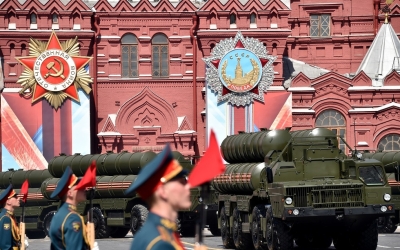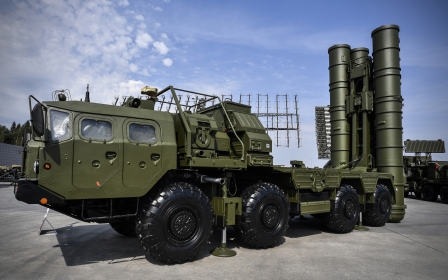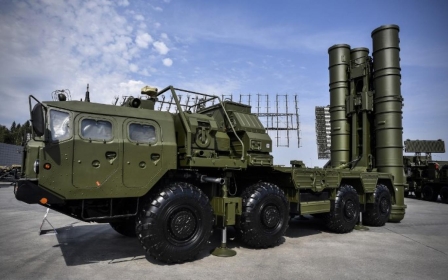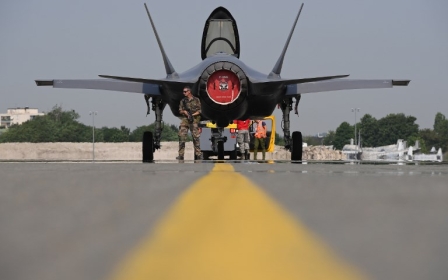US blocks Turkey from F-35 programme over Russian missile defence purchase
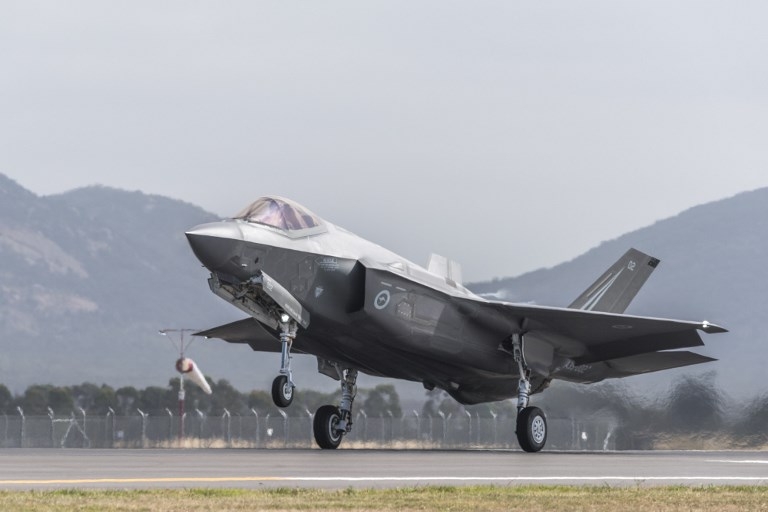
The United States has cancelled its F-35 fighter jet sales to Turkey over Ankara's purchase of Russia's S-400 air defence systems, the White House confirmed, after months of tensions between the NATO allies over the deal.
Last week, the first shipment of Russian S-400s arrived at Murted Air Base outside the Turkish capital Ankara, the Turkish defence ministry announced, after President Recep Tayyip Erdogan had insisted the purchase must go ahead.
"Unfortunately, Turkey's decision to purchase Russian S-400 air defense systems renders its continued involvement with the F-35 impossible," the White House press secretary said in a statement on Wednesday.
"The F-35 cannot coexist with a Russian intelligence collection platform that will be used to learn about its advanced capabilities."
Ellen Lord, the US under secretary of defence for acquisition and sustainment, said "the US and other F-35 partners are aligned in this decision to suspend Turkey from the programme and initiate the process to formally remove Turkey".
Still, the White House insisted that Washington would continue building its military relationship with Turkey despite the S-400 deal.
"The United States still greatly values our strategic relationship with Turkey," its statement read.
Turkey responded saying that the move to prohibt them from the programme is "unfair", Turkey's defence ministry said in a statement.
"This one-sided step neither complies with the spirit of alliance nor is it based on legitimate reasons," the statement added, which was reported by the AFP news agency.
But Ankara's acquisition of the S-400s may open the country up to US sanctions under the Countering America's Adversaries Through Sanctions Act (CAATSA), which prohibits the sale of military technology to foreign entities that may breach or exploit classified components.
The US has previously said the S-400s are not compatible with NATO's defence network and could compromise its Lockheed Martin F-35 stealth fighter jets, which Turkey had purchased to revamp its fleet.
The two NATO allies have sparred publicly for months over Turkey's order of the Russian system.
Earlier this week, US President Donald Trump expressed dismay over the issue. "Turkey is very good with us, very good," Trump told reporters on Tuesday.
"And we are now telling Turkey, because you have really been forced to buy another missile system, we're not going to sell you the F-35 fighter jets," he added.
Russian S-400s: A timeline of US-Turkey tensions
+ Show - HideIn recent weeks, tensions between the United States and Turkey have increased over Ankara's decision to purchase missile defence systems from Moscow.
The US says the Turkish government's plan to acquire Russian systems poses a threat to the F-35 aircraft, and has threatened to kick Turkey out of the F-35 programme if it doesn't scrap its deal with Russia.
Here's a timeline of tensions between the NATO allies over the past several years:
1999: The F-35 programme begins, with Turkey joining as a partner along with Australia, Canada, Denmark, Italy, the Netherlands, Norway, the United Kingdom and the United States.
September 2009: The US Defence Security Cooperation Agency (DSCA) notifies Congress that it is considering the sale of a $7.9bn Patriot missile defence system to Turkey.
5 January 2012: Turkey orders its first two F-35s.
September 2013: Turkey announces that it has decided to purchase a Chinese missile system, thereby rejecting US, Russian and French-Italian options.
7 January 2015: Turkey orders four more F-35 jets.
November 2015: After years of arguments with its NATO allies, Turkey says its deal to buy the Chinese missile system has been scrapped.
14 July 2017: Turkey agrees to purchase as many as four S-400 missile defence systems from Russia for $2.5bn. The decision means Ankara has turned down a US offer to purchase Patriot systems, which did not include a transfer of missile technology.
27 July 2017: US lawmakers pass the Countering America's Adversaries Through Sanctions Act (CAATSA), imposing sanctions on Iran, North Korea, and Russia.
The law would later be used to threaten sanctions on countries that seek Russian weapons systems, including the S-400.
April 2018: Turkey says the S-400 systems are expected to arrive in Ankara in July 2019.
June 2018: The first two F-35s are transferred to Arizona, where Turkish pilots begin training.
September 2018: Turkey begins constructing sites for the S-400 systems.
Meanwhile, US President Donald Trump's administration sanctions the Chinese military for the acquisition of S-400s in breach of CAATSA. Turkey argues it is exempt from the act, however, as its S-400 deal came before CAATSA was made into law.
December 2018: The US gives Ankara the green light to purchase a $3.5bn package of Patriot systems, giving them until 15 February to agree on a deal.
16 February 2019: Turkey says there is no going back from its deal with Russia and rejects the US offer.
19 February 2019: US Vice President Mike Pence speaks to Recep Tayyip Erdogan, urging the Turkish president to renege on the Russian S-400 deal in favour of the American one. Erdogan responds by saying that Ankara's deal with Moscow is at a point of no return.
1 April 2019: The US announces it has halted the delivery of training and other F-35 equipment to Turkey.
9 April 2019: US senators threaten sanctions on Turkey, and once again urge the country to scrap its deal with Russia. Meanwhile, two more F-35s are sent to Arizona to be used for the training of Turkish pilots.
17 April 2019: During delegation trip to Washington, Turkish Defence Minister says talks with US counterpart were "constructive", while revealing little in terms of details.
23 May 2019: Deputy Turkish foreign minister Yavuz Selim Kiran says US did not threaten Turkey with sanctions over its failure to cancel the purchase of Russian-made S-400s by the first week of June. He insists Washington is searching for temporary solutions to the crisis.
31 May 2019: Turkish officials tell Middle East Eye that the US has accepted an offer to form a joint technical study group with Turkey to investigate Washington's concerns over Ankara's purchase of the Russian-made S-400 missile system.
7 June 2019: The US presents Turkey with an ultimatum: Cancel plans to buy Russia's S-400 defence system by 31 July or be expelled from the joint F-35 training programme.
14 June 2019: Turkey threatens to take "reciprocal steps" if the US imposes sanctions over its purchase of the Russian S-400 systems.
Last June, Turkey received the first shipment of US F-35 stealth fighter jets from Washington.
Turkish pilots were in the US receiving training on the first batch of F-35s and Ankara had expected to buy 100 of the jets.
However, the Pentagon issued a letter last month saying that Turkey had until the end of July to reconsider its purchase from Russia or the US would be forced to kick the Turkish pilots out of the F-35 programme.
Middle East Eye propose une couverture et une analyse indépendantes et incomparables du Moyen-Orient, de l’Afrique du Nord et d’autres régions du monde. Pour en savoir plus sur la reprise de ce contenu et les frais qui s’appliquent, veuillez remplir ce formulaire [en anglais]. Pour en savoir plus sur MEE, cliquez ici [en anglais].


